
USU Genetics Researchers Receive National Award for Cancer Genome Work

Uniformed Services University faculty Dr. Hai Hu (left) and Dr. Matthew Wilkerson (right) were among the members of The Cancer Genome Atlas team who received awards from the AACR for their work sequencing the cancer genome. (Courtesy photo)
Two USU scientists have been lauded by the American Association for Cancer Research (AACR) for their efforts to create a detailed catalog of genomic change associated with specific types of cancer and pan-cancer studies.
Dr. Matthew Wilkerson, the Data Science Core director of USU’s Center for Precision Medicine in Military Medical Education and Research, research associate professor of Anatomy, Physiology and Genetics, and a USU contract employee of the Henry M. Jackson Foundation for the Advancement of Military Medicine (HJF), was among the only 129 selected from approximately 1,000 members of The Cancer Genome Atlas (TCGA) team honored with the AACR’s Team Science Award during the association’s virtual annual meeting, June 22-24. The award recognizes an outstanding interdisciplinary team of researchers for their innovative and meritorious science that has advanced or may advance fundamental knowledge of cancer, or a team that has applied existing knowledge to advancing the detection, diagnosis, prevention, or treatment of cancer.
“I am honored to be selected as a recipient of the 2020 Team Science Award from the American Association for Cancer Research for my efforts in The Cancer Genome Atlas,” Wilkerson said. “As part of the TCGA, I was co-chair for the pheochromocytoma study and performed computational genomics analysis for a variety of other tumor types. Our teamwork resulted in world-class discoveries into the molecular basis of cancer. In particular, my genome data analysis methods identified new subtypes of cancer based on molecular profiles – thus characterizing new molecular pathology and paving the way for more precise tumor diagnosis. Our results are very exciting to me because they are clinically-relevant and lead to future patient benefit.”
In addition to Wilkerson, Dr. Hai Hu, a research associate professor in USU’s Department of Surgery, council member for the John P. Murtha Cancer Center and chief scientific officer for the Chan Soon-Chiong Institute of Molecular Medicine at Windber in Windber, Pennsylvania, was also among the award recipients.
“I am honored to be recognized as one of the selected awardees from TCGA for the AACR 2020 Team Science Award. We became part of the TCGA first as a tissue source site for the breast cancer study, for which the Clinical Breast Care Project (CBCP) contributed 10% of the samples exclaimed of the highest quality,” said Hu. “At the same time, we participated in data analysis and emerged as the leader for TCGA clinical data analysis, publishing important papers in top journals and ultimately developed the TCGA Clinical Data Resource published in Cell. For these studies, Mr. Jianfang Liu, our Senior Statistical Analyst, shouldered most of the data analysis responsibilities, working intelligently and diligently to derive outstanding statistical results. In this whole course, Dr. Craig D. Shriver, CBCP principal investigator and MCCRP director, played a pivotal leadership role in making the organizational decision to join TCGA, giving me full freedom and unwavering support which enabled us to unveil the values of the TCGA clinical data.”
The Cancer Genome Atlas Project began in 2006 as a joint effort between the National Cancer Institute (NCI) and the National Human Genome Research Institute. Researchers with diverse backgrounds from a number of institutions throughout the nation were brought together to create the cancer genomic catalog. Since then, TCGA has expanded its research to improve the prevention, diagnosis, and treatment of numerous cancers. The TCGA founders and selected current project team members were recognized for their extensive collaborations and ongoing efforts to generate one of the largest-ever sets of tumor characterization data.
Since its inception, TCGA has resulted in the molecular characterization of more than 20,000 primary cancer and matched normal samples spanning 33 cancer types. The data generated by TCGA have highlighted changes that possess the ability to drive cancer initiation and progression and transform our understanding of cancer.
In addition to these groundbreaking discoveries, TCGA has revolutionized cancer genomics research by establishing new standards and procedures for managing interdisciplinary teams of biological scientists, clinicians, computational scientists, and pathologists. TCGA has also been influential in developing and implementing universal policies that have made genomic data broadly available for public access.
The initiative faced a number of challenges early on due to the scale of the project, but the founders were determined to make a significant difference in cancer research to benefit cancer patients.
“There was a tremendous amount of work across multiple disciplines to fully sequence cancer genomes, and the significance of discoveries to come out of TCGA cannot be overstated,” said NIH Director Dr. Francis Collins, one of TCGA’s founders. “TCGA continues to be one of the most important tools in the fight against cancer.”
Disclaimer: Re-published content may be edited for length and clarity. Read original post.
Army & Navy providers team up to save soldier’s life
Article
7/6/2020
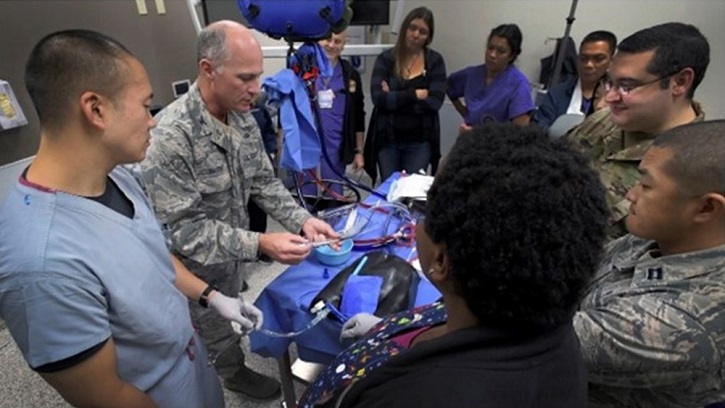
ECMO is a heart-lung bypass system that circulates blood through an external artificial lung, oxygenates it, and delivers it back into the bloodstream.
COVID-19 leads to innovation in military health care practices
Article
7/1/2020
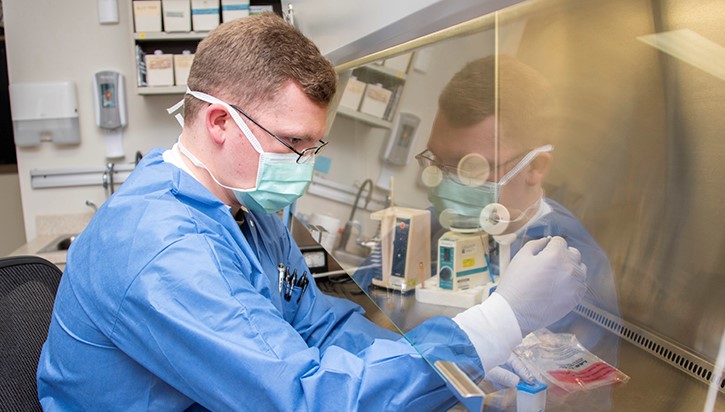
MHS thinks outside of the box to bring care to patients during pandemic
Navy Care virtual health app wins innovation award
Article
6/12/2020
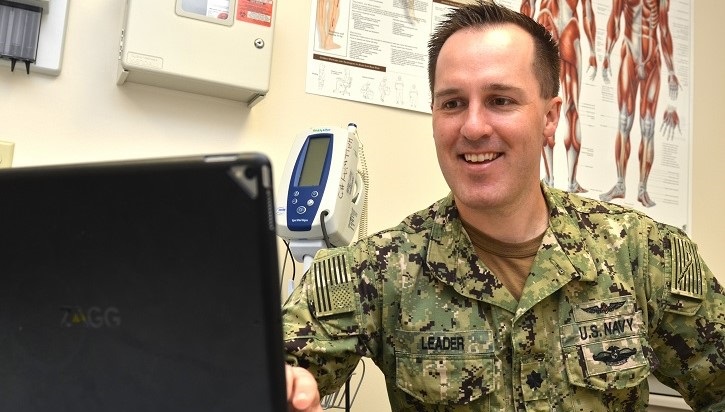
Navy Care offers a live, virtual visit with a clinician — from the patient's smartphone, laptop, or computer.
WRNMMC Recognizes Medical Researchers
Article
6/10/2020
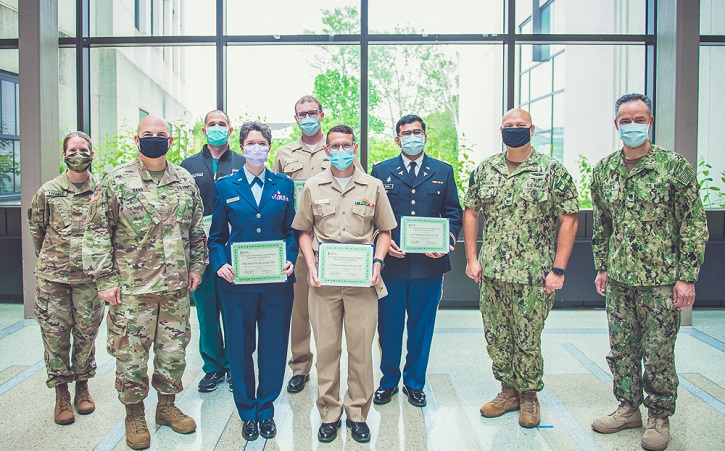
15 winners of Research & Innovation Month awards announced
Call for 2020 Military Health System Research Symposium abstracts open
Article
2/14/2020
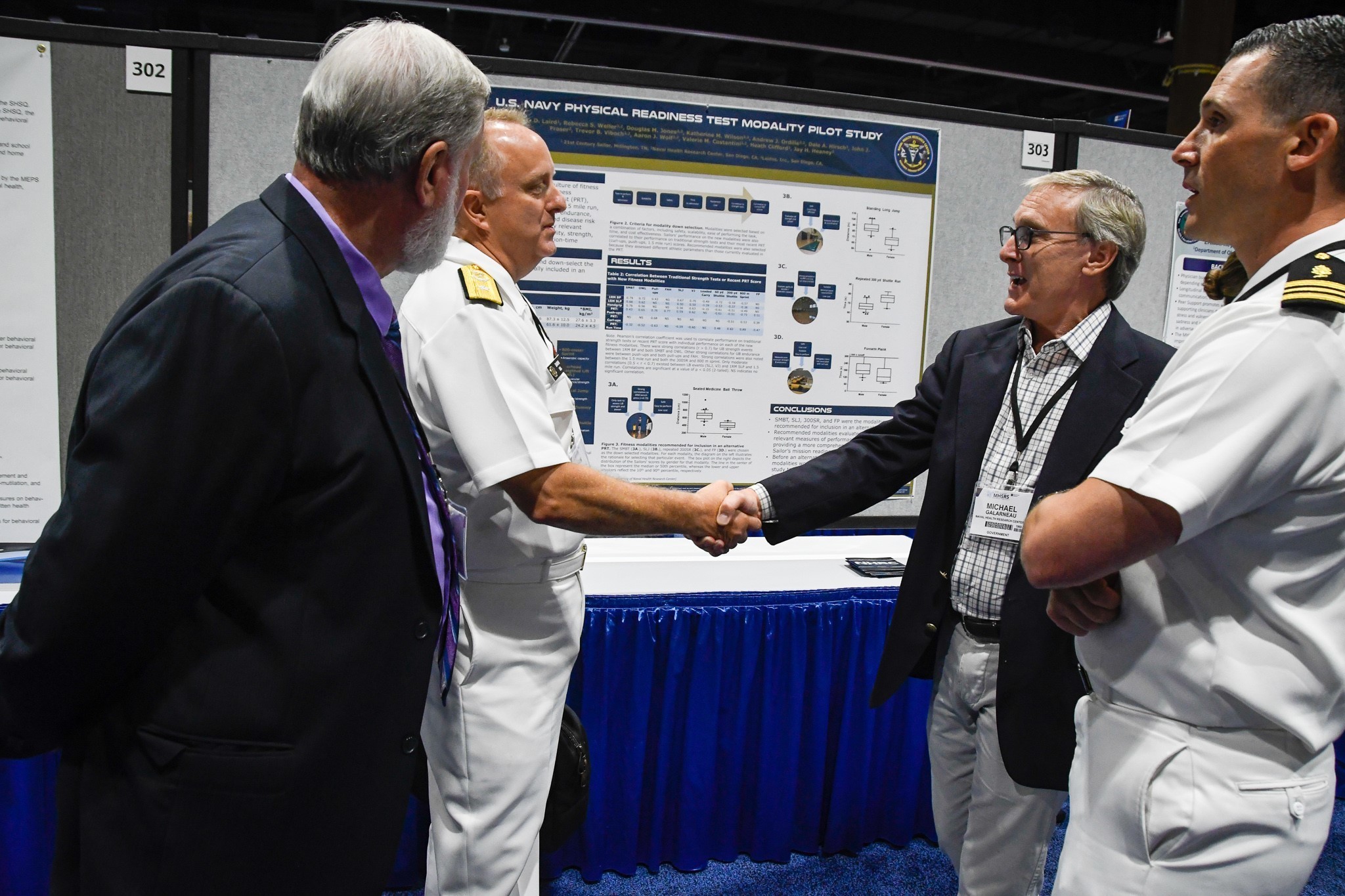
MHSRS is the Department of Defense’s premier scientific meeting
Achievements in 2019 provide strong foundation for year ahead
Article
12/23/2019
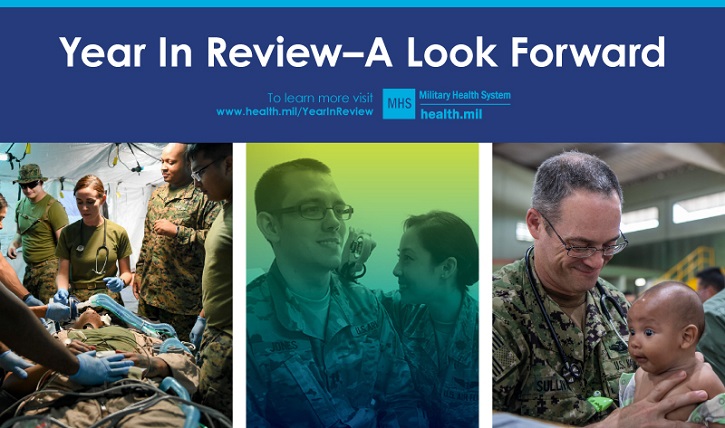
Dedication, commitment to mission praised as changes continue
World AIDS Day puts spotlight on landmark DoD study
Article
12/2/2019
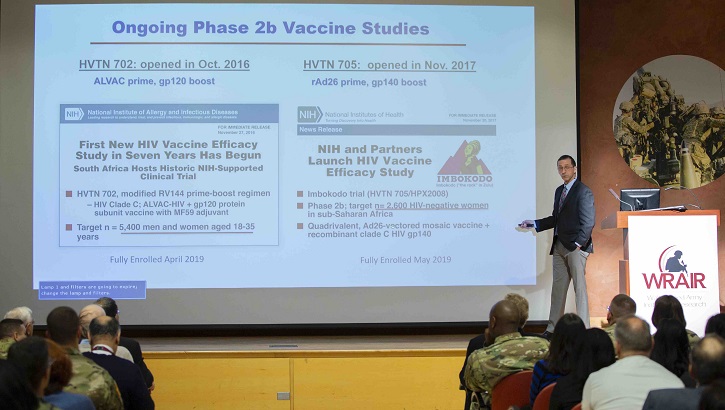
Vaccine study shows infection risk lowered by 31 percent, offering hope for future
Women in DHA create impact across the federal health community
Article
11/4/2019
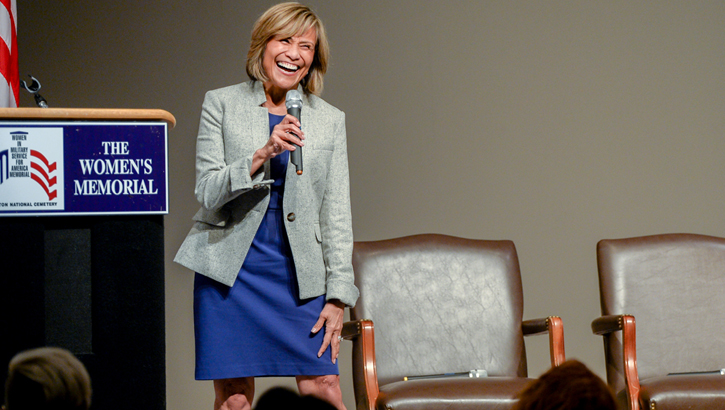
FedHealthIT recognized two DHA leaders, past and present, for their government service during a ceremony in Arlington, Va.
Unleashing innovation to support field medics, corpsmen
Article
9/13/2019
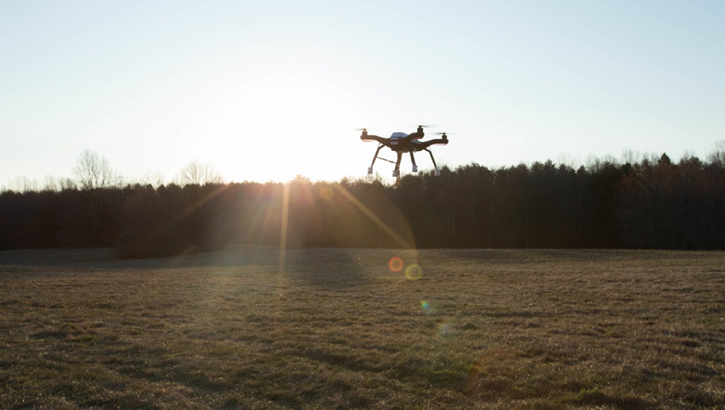
Imagine unmanned vehicles bringing medical supplies or blood products to support a field medic’s care of wounded soldiers, or even transporting a wounded warfighter to safety. Researchers at the Army’s Telemedicine and Advanced Technology Research Center, or TATRC, are collaborating with the Services, academia and private industry to make such scenarios a reality.
Navy Medicine researchers kick off 2019 Military Health System Research Symposium with strong showing
Article
8/20/2019
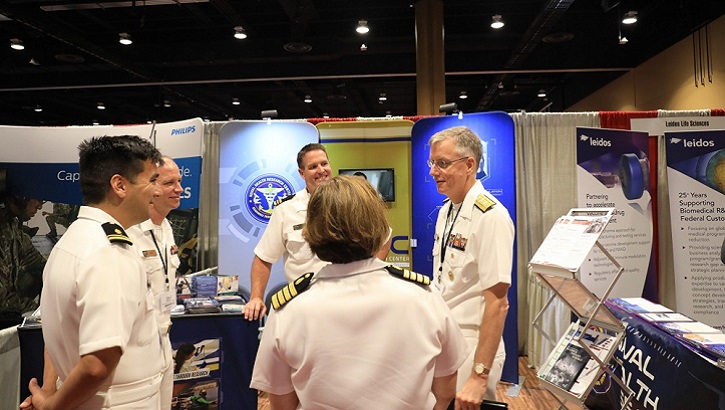
Dozens of scientists from Navy are presenting their work
Individuals, teams honored at MHSRS for exemplary research
Article
8/20/2019
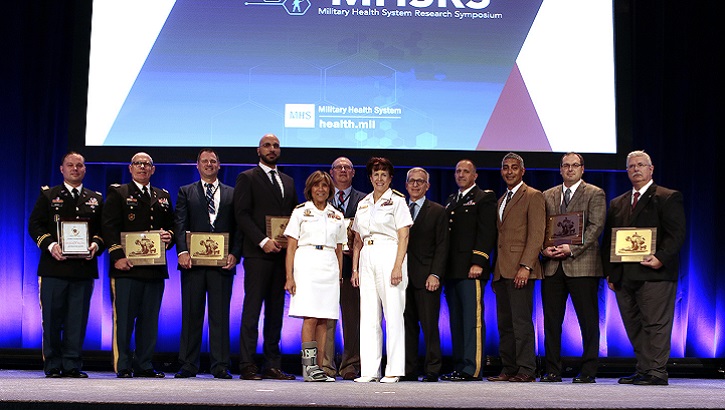
New nurse researcher award debuts this year
Research for Readiness: Military Health System kicks off annual symposium
Article
8/20/2019
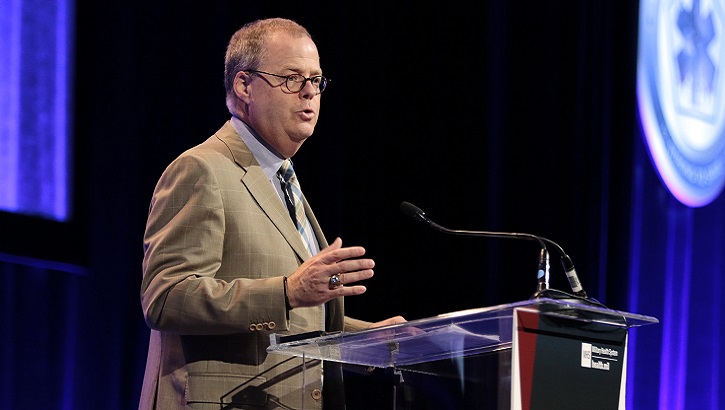
Research, development ensures service members are better prepared, better protected, better cared for
Day 1 at the 2019 Military Health System Research Symposium
Video
8/20/2019
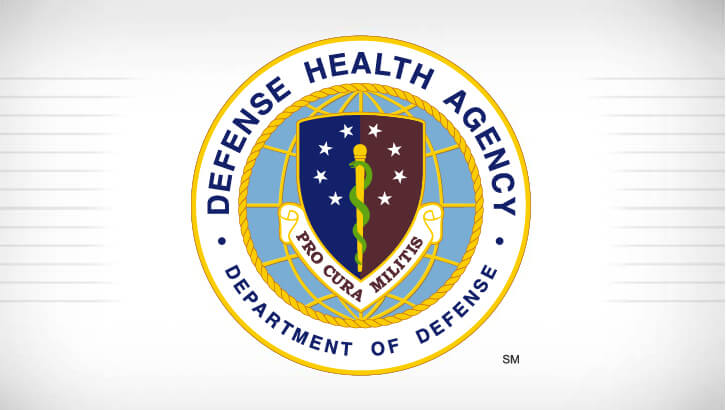
Navy Medicine researchers from across the globe convened Aug. 19 in Kissimmee, Florida for the start of the 2019 Military Health System Research Symposium (MHSRS) to discuss the latest scientific advances and initiatives that support warfighter health, readiness, and survivability. We had a chance to catch up with Navy Medicine leaders to get their perspectives on the impact of research to the warfighter, the Fleet, and the Fleet Marine Force.
DHA-PI 3200.01: Research and Development (R&D) Enterprise Activity (EA)
Policy
This Defense Health Agency-Procedural Instruction (DHA-PI), based on the authority of References (a) and (b), and in accordance with the guidance of References (c) through (p): a. Establishes the Defense Health Agency’s (DHA) procedures for the Deputy Assistant Director (DAD), R&D to manage and execute, on behalf of the Assistant Secretary of Defense for Health Affairs (ASD(HA)), the portion of the Defense Health Program (DHP) Research, Development, Test, and Evaluation (RDT&E) appropriation assigned to it (referred to as the “DHP Science and Technology (S&T) Program)”. The DHP S&T Program includes Budget Activities (BAs) 6.1-6.3 and 6.6. The ASD(HA) provides policy, direction, and guidance to inform planning, programming, budgeting, and execution of the DHP RDT&E appropriation in accordance with statute, regulation, and policy in Reference (a). The DAD-R&D, and Component Acquisition Executive (CAE) manage and execute DHP RDT&E Program funds aligned to them on behalf of the ASD(HA). The CAE is responsible for managing BAs 6.4, 6.5, and 6.7 funding, as well as Procurement and Operations and Maintenance funding required to support DHP-funded Acquisition Programs, regardless of acquisition activity. b. Supports the Director, DHA, in developing appropriate DHA management models to maximize efficiencies in the management and execution of DHP RDT&E-funded activities carried out by the Combatant Commands (CCMDs), Services, Uniformed Services University of the Health Sciences (USU), Defense Agencies, and other DoD Components, as applicable. c. Codifies processes to confirm DHP RDT&E funds are applied towards medical priorities and aligned to ASD(HA) policy, direction, and guidance to develop and deliver innovative medical products and solutions that increase the readiness of the DoD medical mission in accordance with Reference (a). d. Supports the following objectives of the R&D EA: (1) Increasing the quantity, quality, and pace of medical research through improved programmatic organization, processes, and oversight. (2) Ensuring DHP RDT&E funded efforts align to ASD(HA) published program guidance that provides resourcing guidance and translates national, departmental, and Service priorities into specific program objectives. (3) Verifying alignment of DHP RDT&E funds to medical priorities and to ASD(HA) policy, direction, and guidance to ensure the development and delivery of medical materiel and knowledge solutions. (4) Facilitating coordination with the CCMDs, Services, USU, Defense Agencies, and other DoD Components, as applicable, to ensure DHP RDT&E funded activities address joint medical capability gaps, and avoid unnecessary duplication.
- Identification #: DHA-PI 3200.01
- Date: 8/9/2019
- Type: DHA Procedural Instruction
- Topics: Research and Innovation
New DHA health services research funding opportunity available
Article
7/1/2019
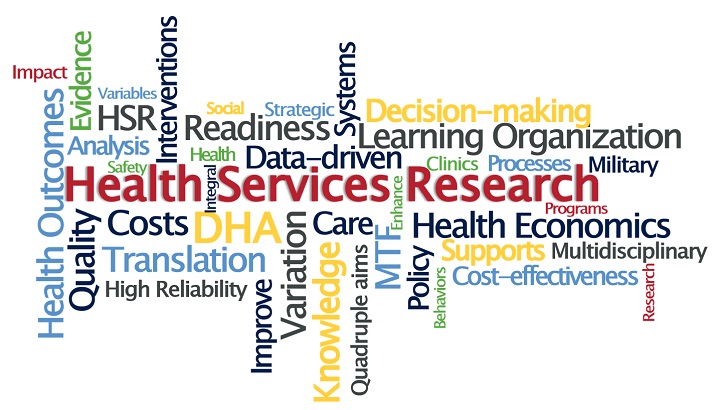
This new funding opportunity is available to both intramural and extramural research organizations





















.png)












No hay comentarios:
Publicar un comentario